
Tenggulang Baru
Layanan Mandiri
Login Admin
Rekap Kehadiran
Artikel/Berita
BERITA
Jimmy Carter: 12 Controversial Facts and Positions Former 39th US President
Admin TB
28 November 2023 23:31:11
215 Kali Dibaca
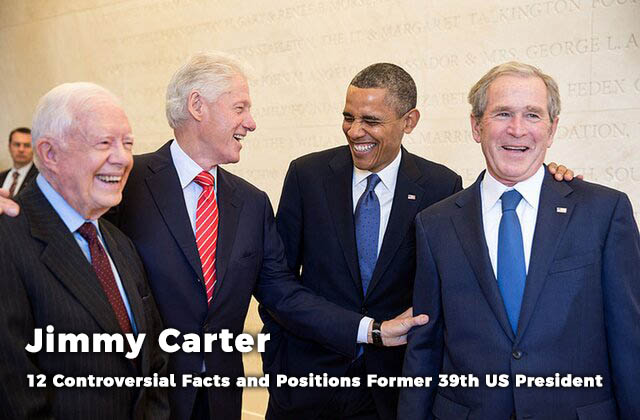
There is a common thread to why the 39th US president, Jimmy Carter, is considered much more successful as a former president by some historians. Nevertheless, in his four years in office, Jimmy Carter was plagued by economic crises, unrest abroad, and an unpleasant relationship with Congress and the press. Carter also left office with an approval rating of 34 percent. Making him the only Democratic Party president since the 19th century not to be elected to a second term.
His influence on politics and policy in the Democratic Party since his defeat in 1980 has been minimal. However, his post-presidential activities through the Carter Center and Habitat for Humanity received widespread recognition. This changes expectations for presidents after their term in the White House ends.
A narrow view of Carter's role as president and former president tended to sink his political career. Jimmy Carter was only underestimated as a simple bean farmer, who chose to enter the world of politics. However, during his presidency, Jimmy built houses for the homeless and his social benevolence towards American citizens, which actually caused contradictions among political officials.
-
Jimmy Carter was born to parents who had different views on race issues

Jimmy Carter with his dog, Bozo, in 1937, when he was about 13 years old (commons.wikimedia.org/NARA/Jimmy Carter)
Jimmy Carter, like many modern presidents, had a father who had high hopes for his son and a mother who nurtured him into a confident and ambitious child. However, Carter's parents raised him from a very different perspective regarding his views on race.
James Earl Carter Sr., Jimmy Carter's father, was an admired figure in the town of Plains, Georgia. PBS said that he was a highly committed segregationist. However, his wife, Lillian Carter, actually contradicts this idea. He ignored social norms that tended towards segregation. Apart from that, Lillian is a person who easily gets along with everyone, such as often helping her black neighbors.
Jimmy Carter himself really admired his father. Apart from that, Jimmy Carter also respected his mother's example in embracing different races. The influence of both his parents and the insight they provided into different perspectives emerged early in Jimmy Carter's political career. According to the UVA Miller Center, Jimmy Carter won the support of leading segregationists in Georgia in his run for governor of Georgia in 1970. Carter also surprised many when he spoke out against segregation in his inaugural speech after narrowly winning the gubernatorial election. Carter then increased the presence of African Americans in the Georgia government.
-
Jimmy Carter became an officer in the US Navy and studied nuclear energy
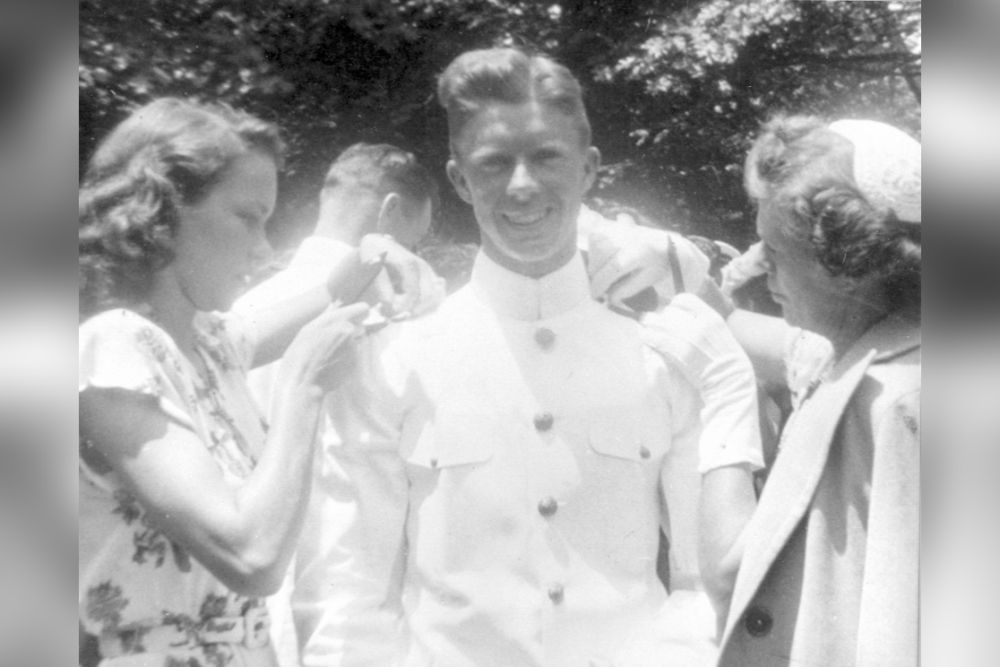
Jimmy Carter's graduation from the U.S. Naval Academy, Annapolis, Maryland, accompanied by Rosalynn Carter (left) and Lillian Carter (right), who are pinning the Ensign Bars, on June 5, 1946. (commons.wikimedia.org/Jimmy Carter Library and Museum)
Although Jimmy Carter admired his own father, he did not want to get involved in managing the family farm. Jimmy instead followed his uncle's example and joined the US Navy. Jimmy entered the Naval Academy in the midst of World War II and began serving in 1946, wrote the Jimmy Carter Presidential Library & Museum page. In 1952, he reached the rank of lieutenant and was known as a dedicated and friendly officer.
Jimmy Carter dreamed that one day he could command his own submarine. However, this prospect is considered too long. According to the book Jimmy Carter (1997) by Peter G. Bourne, the young officer instead chose to apply for a new nuclear program in the Navy. Jimmy Carter was also required to take a nuclear physics course at Union College and a nuclear reactor dismantling simulation.
By the time his training was complete, Carter eventually became an engineering officer aboard the USS Seawolf, the second nuclear submarine added to the American fleet. However, Carter's naval career was cut short by the death of his father. Earl died of pancreatic cancer on July 22, 1953. His mother, shaken by the loss of her husband, prompted Jimmy Carter to end his service in the navy to return to Georgia.
-
Jimmy Carter and his family once lived in government-owned public housing

Jimmy Carter and his family celebrating Christmas at home, on December 25, 1978. (commons.wikimedia.org/Carter White House Photographs)
Jimmy Carter returned to Georgia in 1953 after the death of his father, Earl. When he arrived in his hometown, he was immediately hit by many problems. One of them, Jimmy Carter had to pay off most of his father's debts.
Earl was a fairly wealthy man, as his farming and business provided important benefits to society. However, the town of Plains lacked adequate means of farming after Earl died. Carter's mother felt unable to handle everything alone and forced Jimmy Carter to come home. On the other hand, Carter's wife, Rosalynn, was happy with their life in the Navy and did not want to return to Georgia.
To make matters worse, the following year, Georgia was hit by a severe drought that caused losses to the Carter family's peanut farm. His net profit in 1954 was only around 187 US dollars or the equivalent of Rp. 2.9 million. His business was deteriorating and Jimmy Carter's salary in the navy was low, leaving his family unable to afford their own home.
According to the book Jimmy Carter (2004) by Beverly Gherman, Jimmy Carter, Rosalynn, and their three children moved into an apartment which was part of a government project in the form of public housing for underprivileged residents. Ironically, before returning to the Plains, Carter was criticized by his congressional representatives for living in public housing.
However, no serious problems befell the Carter family while they lived in public housing. Fate and the weather began to be kind in 1955, making the Carter family leave their public housing. The Carter family managed to raise money from business ventures, and enjoyed a bountiful peanut harvest.
-
Jimmy Carter became a victim of voting fraud

Jimmy Carter and the Mayor of Chicago, Richard J. Daley, at the Illinois State Democratic Convention in Chicago, on September 9, 1976. (commons.wikimedia.org/Thomas J. O'Halloran)
Accusations of election fraud can be a serious problem and can be a fatal threat to democracy. Reported by Reuters, this is a crime that is so rare that a study of more than one billion ballots cast between 2000 and 2014 found only 31 cases of fraud. However, an event that is very rare doesn't mean it never happens, right. In fact, this happened to Jimmy Carter.
Following in his father's footsteps as a politician, Jimmy Carter decided to run for office. He campaigned for his candidacy for the Georgia State Senate in 1962 against Homer Moore, a well-known politician with a strong base of support. According to Carter, Moore is a respectable opponent. However, Moore had the backing of Joe Hurst, the Democratic party boss in key areas like Quitman County and a master of dirty politics. Hurst wants to have state senators who are pro him to protect his dirty work in politics.
Carter had also been warned previously that the vote count in Quitman County might involve fraud. Vote monitors even reported voter intimidation, ballot destruction, and a lack of confidentiality surrounding voting. This practice was rare in Georgia at the time. However, Carter refused to accept the results of the rigged election, which led to his narrow defeat. The investigation carried out was in his favor. When the election was repeated, Carter had a narrow lead.
-
Jimmy Carter also used dirty strategies when campaigning

President John F Kennedy (in a rocking chair) meets with Georgia Governor-elect Carl Sanders in the Oval Office, White House, Washington, D.C. on November 15, 1962. (commons.wikimedia.org/Abbie Rowe)
Jimmy Carter was famous for not being afraid to expose cruel political campaign strategies. He was also known as a gentleman, and his work outside the White House was universally admired. Carter himself admitted that he did not want to get involved in cruel political policies. As many people around the world observed, Jimmy Carter was able to convince many people that he was an honest person.
However, a look back at Carter's 1970 campaign for governor of Georgia proves that he too could play dirty. His opponent in the democratic primary is former governor Carl Sanders. Sanders was very popular at the time, he was a public figure who strongly upheld racial equality, and was mentioned as a potential vice presidential candidate for the Kennedy family, as explained by the Atlanta Journal-Constitution.
Jimmy Carter himself did show courage in racial issues in the navy and as a businessman.
Carter accused Sanders of banning George Wallace (governor of Alabama) from entering Georgia. Then, mysteriously, thousands of flyers appeared across the state, linking Sanders to Negroes. In the leaflet, Sanders seemed to be mocking black people, and reflecting how racist he was.
Carter himself denied any involvement with the leaflets. These dirty tactics earned Carter his governorship. While in office, he worked to end segregation. However, Sanders never forgave him.
-
Jimmy Carter broke the judicial record among other former US presidents

Portrait of Jimmy Carter on April 14, 1977. (commons.wikimedia.org/Carter White House Photographs)
After becoming president, Jimmy Carter had a major influence on the American justice system. One of his first orders of business, even before being sworn in, was to convince white supremacist senator James Eastland, chairman of the Senate Judiciary Committee, to cede control of federal judicial nominations to a federal commission, as Slate reported. The commission's recommendations were often supported by Jimmy Carter and the Senate.
This is what has led to the unprecedented diversification of federal judges. Jimmy Carter appointed 40 women and 57 people from minority backgrounds. And he oversaw a significant expansion of the federal judiciary.
However, Carter never had the opportunity to appoint justices to the Supreme Court. He wasn't the only president not to be named his nation's highest justice, William Henry Harrison, Zachary Taylor, and Andrew Johnson also didn't get the chance. However, of the four people, Carter is the only president who has served a full term.
-
Jimmy Carter's presidency leaned more towards the conservative side

Jimmy Carter in his office on November 7, 1977 (commons.wikimedia.org/Carter White House Photographs)
His Position was Controversial, 12 Facts about Former US President Jimmy Carter Jimmy Carter in his office on November 7 1977 (commons.wikimedia.org/Carter White House Photographs)
One of the biggest changes in politics since the 1970s has been the disappearance of the liberal Republican Party and Democrats leaning more towards the conservative. Political observers consider Jimmy Carter to be a liberal supporter. However, this is different from Carter's own statement.
"I am basically conservative in my attitude toward government," he said during the 1970 gubernatorial election, as quoted by The Atlanta Journal-Constitution. Carter adapted to the liberal presidential campaign trail in 1976. However, once in office, he returned to his conservative instincts. This attitude often causes dissatisfaction with the party itself.
A contemporary report from The Washington Post examined the dichotomy between Jimmy Carter and Democratic members of Congress. One Congressional leader even complained that Jimmy Carter's economic policy plans placed him to the right of Richard Nixon.
Tensions in the House were higher than in the Senate, but Jimmy Carter reached an agreement with his party. Carter signed the Humphrey-Hawkins Full Employment Act, a well-respected liberal piece of legislation. However, this was significantly reduced from its initial goal of providing jobs and achieving the unemployment target of 4 percent, wrote The American Yawp report.
-
Jimmy Carter received the last telephone call from Elvis Presley

Elvis Presley at the White House (commons.wikimedia.org/Ollie Atkins)
Jimmy Carter is related to Elvis Presley. "Elvis is my cousin," Carter said confidently. The reason is, Elvis Presley was related on Jimmy Carter's mother's side, reports CBS News. The two would meet every time Elvis Presley came to Georgia. Carter once attended his cousin's concert and Presley visited the Carter family in Atlanta.
However, in 1977, Jimmy Carter got a call from Elvis Presley. It was only a few months since Presley's sudden death. There is speculation that before his death, Elvis Presley was given barbiturates.
"I don't know what he said. His sentences were almost incoherent," Carter told The New Yorker. Jimmy Carter finally realizes that his cousin wants to ask for a pardon for a sheriff he knows, and that this sheriff is having legal trouble. Jimmy Carter tried to calm Presley so that he would not become paranoid and continue to have false illusions. Carter said, "I don't think he understands it." It was the last time his cousin spoke before Elvis Presley's death.
-
Two government departments passed under Jimmy Carter's supervision

Solar installation of microcrystalline photovoltaic modules on top of a home by the U.S. Department of Energy (commons.wikimedia.org/U.S. Department of Energy)
As president, Jimmy Carter oversaw significant deregulation. Airlines, trains, trucks and craft breweries are exempt from oversight, making travel cheaper and craft breweries everywhere, according to a UVA Miller Center report. However, Carter also significantly expanded the executive branch of government. Jimmy Carter passed the Ethics in Government Act, established FEMA, and was in charge of two cabinet-level departments.
The Department of Education existed before Jimmy Carter. Quoted by The Politico, Andrew Johnson became the first president to create the Department of Education in 1867. However, this department only lasted one year, and became a victim of political reconstruction and the government's role in the education system is still questionable.
Jimmy Carter himself pushed for a new Department of Education in 1979 to help improve federal education programs. The department faces significant challenges in Congress. And there are disputes about the government's role in schools that continue to haunt the department. However, Carter's policies still exist today.
Carter also oversaw the creation of the Department of Energy, in order to implement his ambitious policies in this area. This agenda was outlined in two major policies during his tenure, ranging from oil supply regulations to funding for renewable energy and new generation nuclear reactors. It all represented Jimmy Carter's most significant domestic success. Although he received little praise during his tenure.
-
Jimmy Carter was considered successful in handling the Cold War during his administration
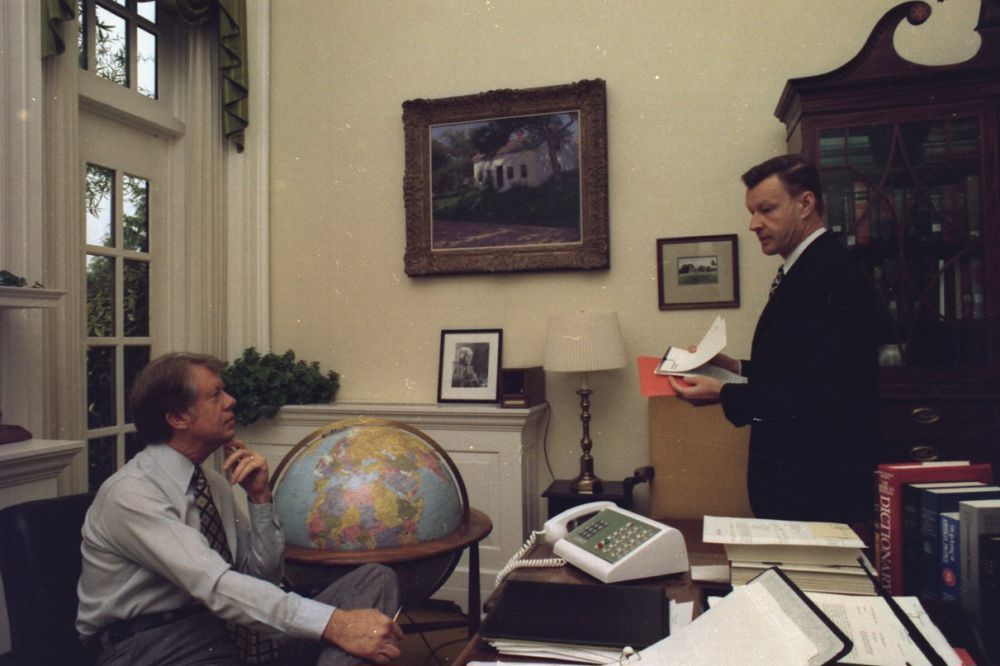
Jimmy Carter and National Security Advisor, Zbigniew Brzezinski (commons.wikimedia.org/Carter White House Photographs)
In many people's memories of the Cold War, Ronald Reagan is the president most associated with the end of the conflict. Reagan's friendly relationship with Mikhail Gorbachev helped end tensions. Although observers branded him a warmonger.
However, it was Jimmy Carter who took advantage of the failure of the Soviet economy in the late 1970s, The Conversation said. Because agriculture was a weak point for the communist nation, the Carter administration imposed an embargo on wheat imports to the Soviet Union. Elsewhere, Carter denied the Soviets international prestige when he promoted the US boycott of the 1980 Moscow Olympics. Carter also turned soft power against the Soviet Union by attacking and exposing Soviet human rights abuses against its own citizens.
The CIA began arming the mujahideen in the Soviet-Afghan War under the Carter administration. Reported by The Nation, Jimmy Carter and his national security advisor, Zbigniew Brzezinski, anticipated that such military assistance (provided through the Symington Amendment solution) would encourage the Soviets to invade Afghanistan and ultimately trap the Soviets in their own war. When the invasion actually occurred in 1980, Jimmy Carter articulated the Carter Doctrine in his State of the Union address. He used military force to guard the Persian Gulf in US interests.
-
Jimmy Carter's bad reputation in the eyes of Americans

Jimmy Carter holds his grandson, Jason Carter, at the White House Easter Egg Roll, on April 11, 1977 (commons.wikimedia.org/Carter White House Photographs)
When he was governor of Georgia, Jimmy Carter was considered arrogance and always felt self-righteous. This was especially evident when he alienated his Democratic colleagues in the state legislature. As president, he faced similar accusations in his relations with Congress, as he was reluctant to negotiate on issues or policies, and was considered too conservative for House Democrats. Additionally, his tensions with the Congress were portrayed as his political incompetence
Carter was also considered to belittle and denigrate journalists, because of media coverage that he may have deemed inappropriate. His speeches in response to the energy crisis of the late 1970s were characterized by blaming Americans for their own woes. Then, false accusations of corruption against his advisers and his younger brother, Billy Carter, damaged his reputation as president.
-
His concern actually influenced the Iranian Revolution

Jimmy Carter and Shah Mohammad Reza Pahlavi, in December 1977 (commons.wikimedia.org/Carter White House Photographs)
Many postwar US presidents considered Shah Mohammad Reza Pahlavi of Iran both a friend and a foreign ally. Jimmy Carter is no exception. His increasingly warm relationship with Mohammad Reza and the importance he placed on the monarchy blinded Carter to hatred of the regime. However, Iranian student militants' hatred of Shah Mohammad Reza forced the Shah to leave Iran in early 1979, following his overthrow.
Shah Mohammad Reza eventually settled in Morocco while hoping for restoration. However, before settling there, he accepted an offer from Jimmy Carter to live at Carter's private plantation in California. Carter did not seem to realize the political impact of bringing Shah Mohammad Reza to America.
In fact, after receiving a strong warning from Ambassador Carter that his good relations with Shah Mohammad Reza would risk causing a violent response in Iran, Carter ignored it. Pressure from conservatives and members of his own cabinet prompted him to allow Shah Mohammad Reza to undergo cancer treatment in New York in October 1979. Despite warnings, Carter did not increase security at the US embassy in Tehran.
Iranian student militant anger at Shah Mohammad Reza's entry into America sparked the storming of the US embassy in November, triggering a hostage crisis in Iran, writes History. Negotiations to free the 52 hostages failed, and a military rescue effort ordered by Carter created new problems. This crisis contributed significantly to Carter's defeat in the 1980 election and worsened US-Iranian relations for decades.
Jimmy Carter's reputation as an aloof and incompetent person was widespread and persists in the memories of many Americans to this day. However, this contradicts some of his achievements. Despite his tensions with Congress, Carter succeeded in steering more of his agenda through Congress than most of his predecessors and successors. For example, the Camp David Peace Accords were a success in his foreign policy that even Carter's own critics acknowledged. However, none of these successes increased the credibility of public support leading up to his 1980 election.
Kirim Komentar
Komentar Facebook
Artikel Menarik Lainnya

Jadwal Lengkap Championship Series BRI Liga 1 2023/2024

Regulasi Championship Series BRI Liga 1 2023/2024, Mulai menggunakan VAR

Hasil Jepang vs Uzbekistan di Final Piala Asia U-23 2024, Skor Dramatis 1-0

Hasil Irak vs Indonesia di Perebutan Peringkat 3 Piala Asia U-23 2024

Prediksi Jepang vs Uzbekistan pada Final Piala Asia U-23 2024

Jadwal Piala Dunia 2022 Qatar Lengkap

Cara Cek dan Daftar Penerima Bansos BPNT BST PKH & BLT BBM di Cekbansos.kemensos.go.id

Doa Niat Puasa Ramadhan Beserta Tata Cara dan Bacaan Lengkap

Bansos BLT BBM 2022 Tahap 2 Cair November, Cara Daftar dan Cek Penerima secara Online

PIP Oktober 2022 Sudah Cair, Begini Cara Cek Namamu di pip.kemdikbud.go.id

Menunggu 4 Tahun Akhirnya Bansos PKH Cair 20 Juta
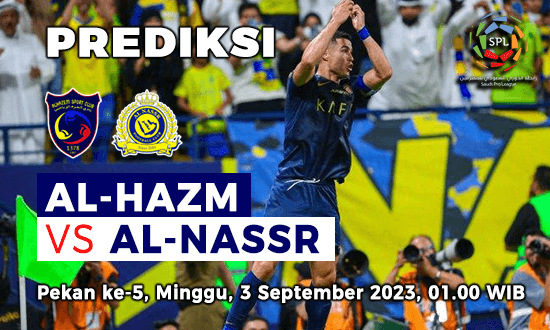
Prediksi Al Hazm vs Al Nassr dalam Pekan ke-5 Liga Arab Saudi 2023-2024

Jadwal Leg Ke-2 Babak 16 Besar Liga Europa 2022/2023, Real Betis vs Man Utd, Arsenal vs Sporting CP

Prediksi Bristol City vs Man City Pada Putaran Ke-5 FA Cup 2022/2023, 1 Maret 2023
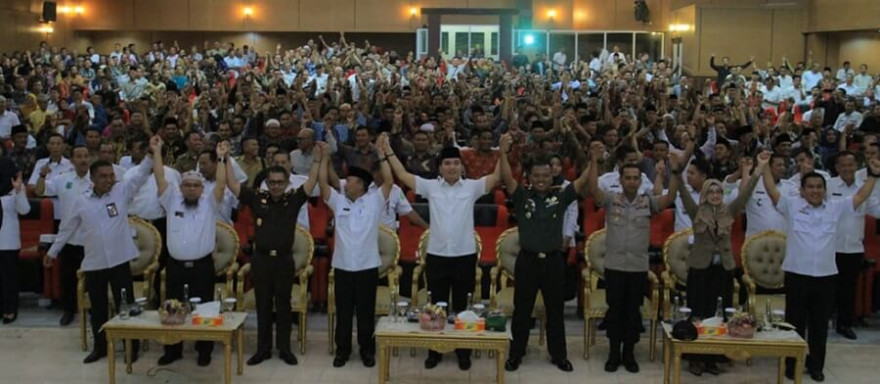
Deklarasi Damai Pilkades Serentak Tahun 2020 Kabupaten Musi Banyuasin
Arsip Artikel

Jadwal Lengkap Championship Series BRI Liga 1 2023/2024

Regulasi Championship Series BRI Liga 1 2023/2024, Mulai menggunakan VAR

Hasil Jepang vs Uzbekistan di Final Piala Asia U-23 2024, Skor Dramatis 1-0

Hasil Irak vs Indonesia di Perebutan Peringkat 3 Piala Asia U-23 2024

Prediksi Jepang vs Uzbekistan pada Final Piala Asia U-23 2024

Jadwal Piala Dunia 2022 Qatar Lengkap

Cara Cek dan Daftar Penerima Bansos BPNT BST PKH & BLT BBM di Cekbansos.kemensos.go.id

Doa Niat Puasa Ramadhan Beserta Tata Cara dan Bacaan Lengkap

Bansos BLT BBM 2022 Tahap 2 Cair November, Cara Daftar dan Cek Penerima secara Online

PIP Oktober 2022 Sudah Cair, Begini Cara Cek Namamu di pip.kemdikbud.go.id

Menunggu 4 Tahun Akhirnya Bansos PKH Cair 20 Juta

Prediksi Al Hazm vs Al Nassr dalam Pekan ke-5 Liga Arab Saudi 2023-2024

Jadwal Leg Ke-2 Babak 16 Besar Liga Europa 2022/2023, Real Betis vs Man Utd, Arsenal vs Sporting CP

Prediksi Bristol City vs Man City Pada Putaran Ke-5 FA Cup 2022/2023, 1 Maret 2023

Deklarasi Damai Pilkades Serentak Tahun 2020 Kabupaten Musi Banyuasin
Komentar
Statistik Pengunjung
| Hari ini | : | 3.176 |
| Kemarin | : | 7.353 |
| Total Pengunjung | : | 92.286 |
| Sistem Operasi | : | Unknown Platform |
| IP Address | : | 172.70.127.127 |
| Browser | : | Mozilla 5.0 |
Menu Kategori
- BERITA
- SEA GAMES
-
BOLA
- Sepakbola
- Piala Dunia
- BRI Liga 1
- Liga 2
- Piala AFF
- La Liga
- Liga Inggris
- Piala FA
- Liga Prancis
- Ligue 1
- Liga Pro Saudi
- Liga Spanyol
- Liga Italia
- Liga Eropa
- Piala Dunia U20
- Liga Champions
- Liga Championship
- League One
- Liga Argentina
- FIFA
- EURO
- International Friendly
- Liga Portugal
- UEFA
- Liga Konferensi Eropa
- Timnas
- Friendly
- Liga Champions AFC
- Carabao Cup/EFL Cup
- Piala Asia
- Liga Champions Asia
- Liga Swiss
- Coppa Italia
- Piala Super Spanyol
- Copa del Rey
- VOLLEYBALL
- OTOMOTIF
- OPINI
- HIKMAH
- PENDIDIKAN
- AGENDA
- PANDUAN DAN LAYANAN
- PERUNDANG2AN
- LAPORAN
- APBDes
- KEPEMERINTAHAN
- KESEHATAN
- CINEMA
- BULUTANGKIS
- TEKNOLOGI
- SEO
- FINANCE
- TUTORIAL
- SOSOK
- WAWASAN
- PERDAGANGAN
- MotoGP
- KHUTBAH
- ASAL USUL
- TOUR
- WISATA
- CERPEN
- BISNIS
- ENTERTAINMENT
- CPNS
- KULINER
- BUDAYA
- KOMODITAS
- EDUKASI
- KEPENDUDUKAN
- ASIAN GAMES
- SEJARAH
- ANEKA TUNJANGAN
- TRENDS
- NUSANTARA
- FENOMENA
- IMSAKIYAH
- LOWONGAN
- Lihat Semua
Pemerintah Tenggulang Baru
SP 5, Tenggulang Baru Kec. Babat Supat Kab. Musi Banyuasin Prov. Sumatera Selatan
Kec. Babat Supat, Kab. Musi Banyuasin
SP 5, Tenggulang Baru Kec. Babat Supat Kab. Musi Banyuasin Prov. Sumatera Selatan
Kec. Babat Supat, Kab. Musi Banyuasin
OpenSID 2405.0.0 - Tenggulang Baru v1.0











